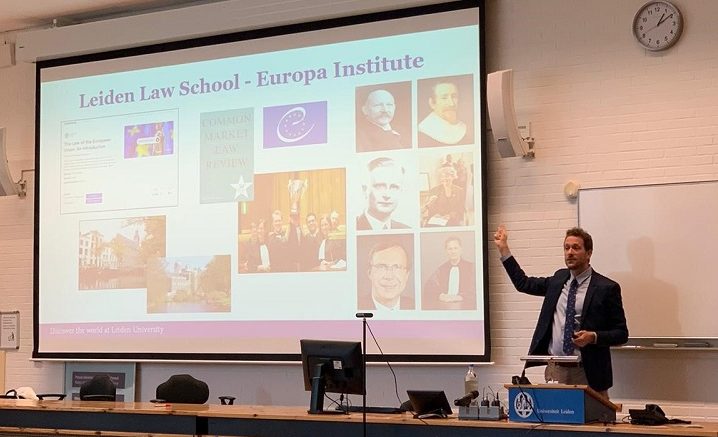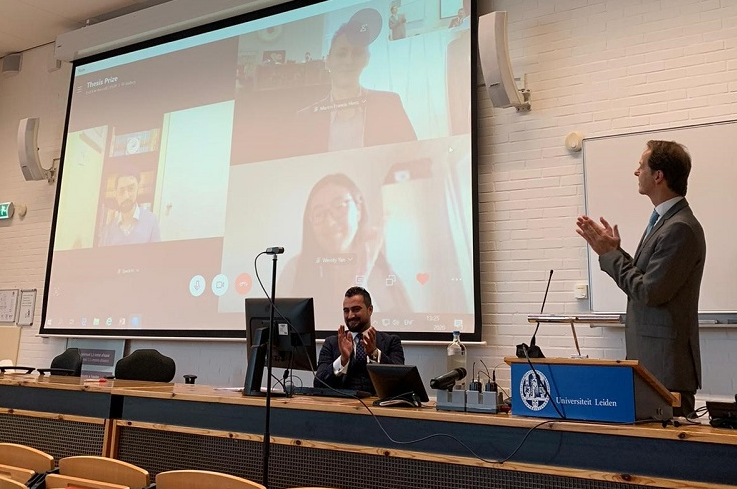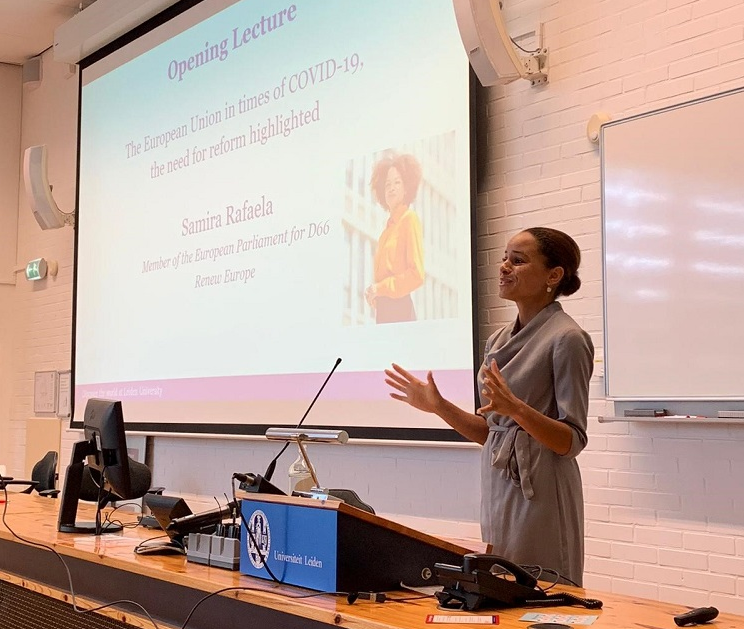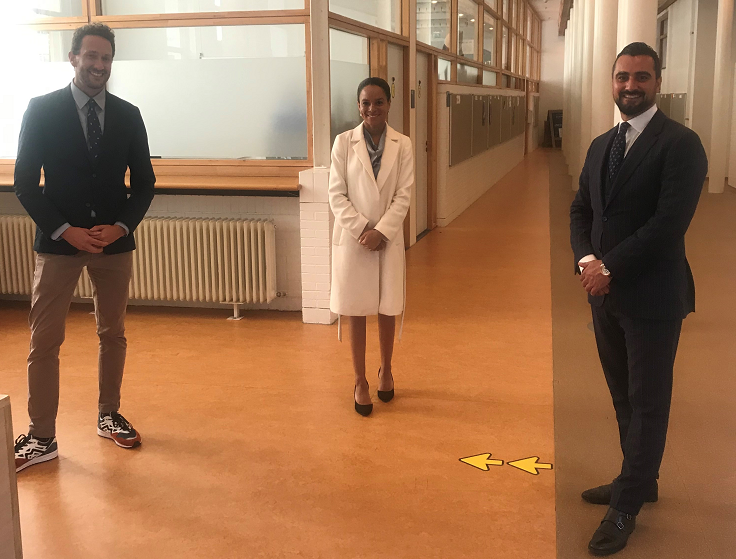
EP Member Samira Rafaela speaks at opening lecture Master European Law
Europe is going to invest billions in those areas where COVID-19 has hit hardest, Ms Rafaela said. ‘And only if we truly show the people that this is because of European solidarity and strong cooperation, will that enable us to create a more perfect Union.’
On Friday 11 September 2020, the opening of the LLM European Law 2020-2021 took place in the Kamerlingh Onnes Building. Ms Samira Rafaela, Leiden University alumna and Member of the European Parliament for D66, gave the opening lecture.
Ms Rafaela started her lecture by telling about her election as Member of the European Parliament. 'After this election, I rushed myself to Brussels where the newly elected Members gathered in their political groups. We now have the third largest group of the European Parliament, called Renew Europe. A liberal pro-European group representing modern democratic values. It was also in this initial stage that we had to express our preferences for Committee memberships. I got my preferred choices: International Trade, Women's Rights and Gender Equality, and Employment and Social Affairs.’ Ms Rafaela, who is of Afro-Caribbean descent, makes a case for tackling racism and discrimination in the EP. ‘And let me be clear: no one should be left behind', she said.
-

Professor Jorrit Rijpma opened the meeting -

Because of Covid-19 measures, a limited amount of visitors was allowed to physically attend the lecture -

Professor Rick Lawson awarded the best thesis prizes... -

...after which Ms Rafaela gave the opening lecture -

Professor Jorrit Rijpma, Ms Samira Rafaela and Amir Ali Abadi, project leader of the Europe Institute
Also, she spoke about the State of the European Union in times of COVID-19. She emphasized the need for European reform. 'If anything, the COVID-19 pandemic has highlighted the need for reform in the European Union. Budgets for a period of seven years are outdated. Seven years ago we were still dealing with the Eurocrisis and since then the United Kingdom has decided to leave the European Union, and back then no one thought society would be hit by a virus as hard as we have been this year.'
The instant reflexes from Member States at the beginning of the epidemic were to take measures at a national level, Rafaela said. 'Various lockdown measures were introduced and borders were closed. We saw footage of lorries in traffic jams waiting to cross the border. The very thing the European Union had achieved was under pressure. However, the big solutions to the crisis took a lot of time to develop. Because the EU budget is set in stone for a period of seven years, the Commission had to write a completely new proposal for the period of 2021-2027 and in parallel the Commission proposed a recovery fund of 750 billion Euros called Next Generation EU.'
Europe will come out of this crisis stronger.
According to Rafaela, lessons need to be learnt from the outbreak of the COVID-19 pandemic. The European Union was clearly not ready to respond in a manner fitting the severity of the situation, she said. But Europe will come out of this crisis stronger, Rafaela concluded. Therefore, an investment of billions is required. 'That will enable us to create a more perfect Union. A Union that is fit for purpose and one that does not necessarily require another crisis to complete the next steps of European integration. And I am hopeful that all the challenges that we are currently facing will be able to propel the European Union into a new phase in which it will be better prepared for the future.'
At the end, Ms Rafaela wished the students all the best during this academic year. 'Please respect the social distancing requirements. Because the sooner we are out of this situation, the better. I will conclude with these three remarks: speak truth to power; stand for your values, they cannot defend themselves; and enjoy your academic year.'
Thesis Prize 2019-2020
During the opening, the 2019-2020 Europa Institute Thesis Award was also presented. Out of three nominees, the jury elected two winners, which is very exceptional. The prize was awarded by Professor Rick Lawson to both David Hamburger and Martin Hiess, respectively for their theses Unintended Consequences?: Discretion, Interpretation, and Human Rights in European and US Near-Border Policing and Understanding and Vindicating the Principle of Subsidiarity – The Deficient Status Quo of Subsidiarity Enforcement Calls for a Specific Procedural Approach. The third nominee, Wendy Yan, also wrote an excellent thesis called Brexit and the Loss of EU Citizenship(rights)? Can, and if so, how can UK citizens retain or regain EU citizenship status or EU citizenship rights following a no-deal Brexit?
Lawson praised the hard work of all master students over the past academic year. 'By completing a thesis in Covid times, these students proved to be extremely flexible. Actually, each and every student who completed a thesis last year deserves a prize.'
